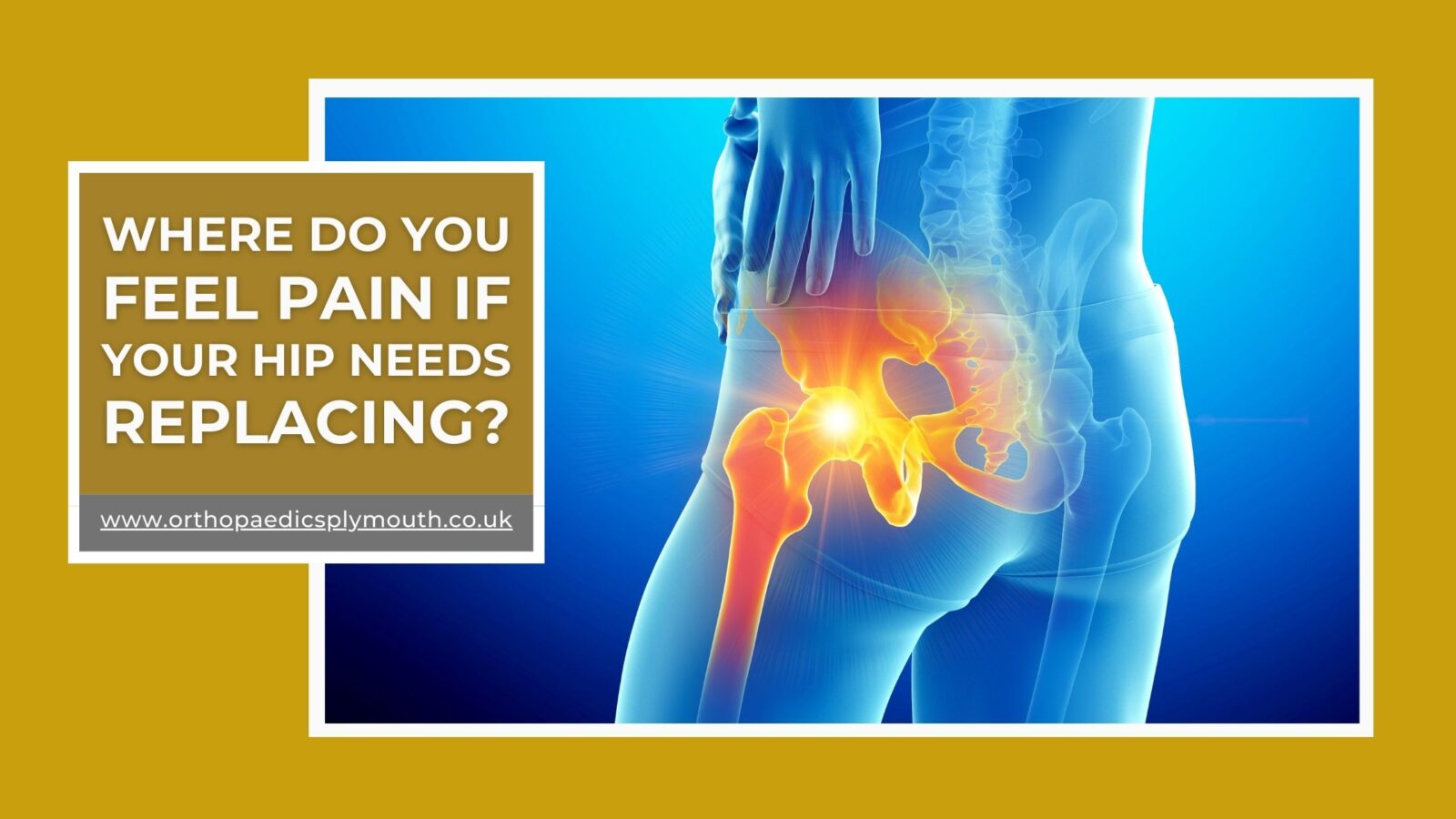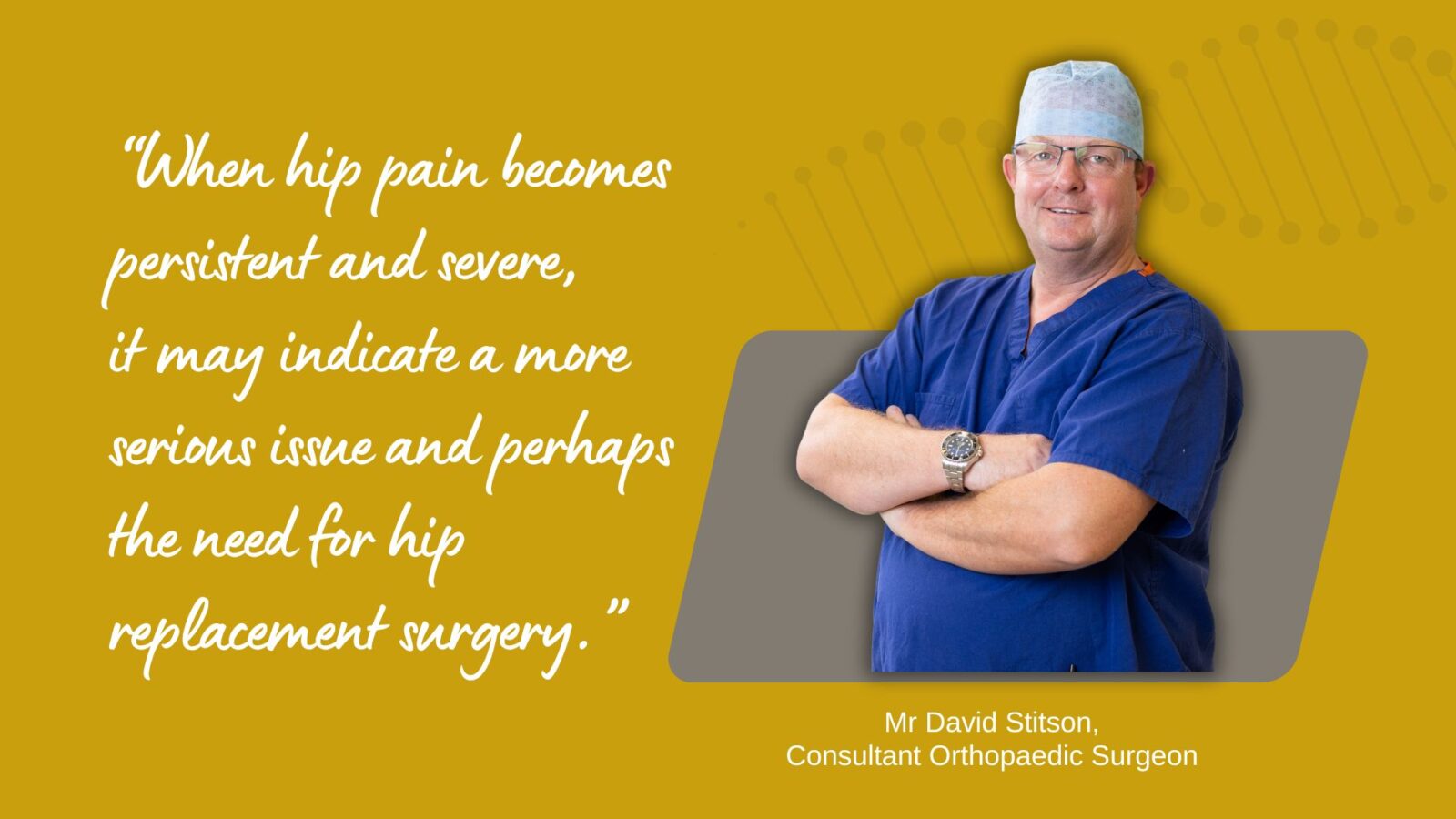Hip Pain Symptoms, Causes, and Treatments
Hip pain can significantly impact your quality of life, making everyday activities challenging and uncomfortable. When the pain becomes persistent and severe, it may indicate a more serious issue and perhaps the need for hip replacement surgery. In this blog, we explore the symptoms, causes, treatments, and FAQs surrounding hip pain and hip replacement.
Contents
ToggleSymptoms of Degenerative Hip Disease Include:
1. Persistent Pain:
One of the primary indicators of a hip problem is persistent pain in the hip joint or groin area. This pain may worsen with movement or weight-bearing activities. Hp joint pain is commonly felt in the groin, the lateral aspect of the hip or the buttock area. Pain may also radiate into the thigh and even to the knee. Occasionally, isolated knee pain is the only indicator that there is a problem with the hip!
2. Stiffness:
Difficulty in moving the hip joint, especially after periods of rest or in the morning, can be a symptom of hip problems.
3. Reduced Range of Motion:
As hip problems progress, you may notice a decreased ability to move your hip through its full range of motion. This can impact everyday activities such as putting your shoes and socks on.
4. Difficulty Walking:
Hip pain can make it challenging to walk, particularly over longer distances or on uneven surfaces.
5. Pain at Night:
Pain that disrupts sleep or worsens at night is common in degenerative hip conditions.
5 Common Causes of Hip Pain:
1. Osteoarthritis:
The most common cause of hip pain leading to hip replacement is osteoarthritis, a degenerative joint disease that affects the cartilage lining the hip joint.
2. Rheumatoid Arthritis (and other types of inflammatory joint disease):
These often autoimmune conditions can also affect the hip joint, leading to pain, inflammation and eventual joint damage.
3. Hip Fractures:
Fractures of the hip, often resulting from falls or trauma, can lead to severe pain and may necessitate hip replacement surgery, either as a result of the primary injury or later on if the hip remains painful.
4. Avascular Necrosis:
This condition occurs when the blood supply to the head of the femur is disrupted, leading to bone tissue death and eventual joint collapse. There are various causes for this and it can also be seen in end-stage osteoarthritis.
5. Other Factors:
Less common causes of hip pain include osteoarthritis secondary to hip dysplasia, damage to the acetabular cartilage labrum, hip impingement, bursitis, tendonitis, and tumours (rarely).
If you are experiencing persistent hip pain, stiffness or reduced mobility, it is essential to consult with a healthcare professional, such as Mr Stitson, who can provide you with an accurate diagnosis and a personalised treatment plan.
Treatments for Hip Pain Include:
• Conservative Management:
Initially, hip pain may be managed with conservative measures such as rest, physiotherapy, pain medications, walking aids and lifestyle modifications.
• Hip Joint Injections:
Corticosteroid injections into the hip joint can provide temporary relief from pain and inflammation in selected cases.
• Hip Replacement Surgery:
When conservative treatments fail to provide adequate relief, hip replacement surgery may be recommended. This procedure involves removing the damaged parts of the hip joint and replacing them with artificial components made of metal, plastic, or ceramic.
Following hip replacement surgery, rehabilitation and physiotherapy are essential to regain strength, mobility and function.
Hip Pain FAQs
- How long does hip replacement surgery take?
The surgery typically takes under an hour. The exact duration can vary depending on factors such as the patient’s overall health and the complexity of the procedure.
- How long is the recovery period after hip replacement surgery?
Recovery times vary, but most patients can expect to return to light activities within 6 weeks and resume normal activities within approximately 3-months.
- What are the risks associated with hip replacement surgery?
Although hip replacement surgery is generally safe, complications can occur. The risks of hip replacement include infection, dislocation of the new hip joint, blood clots (DVT and pulmonary embolus), fracture, Leg Length Discrepancy, Sciatic Nerve Injury, Bleeding, Loosening, wear and need for revision surgery. There is a small increase in the risk of dying in the first 90 days following joint replacement surgery.
- How long does a hip replacement last?
The longevity of a hip replacement depends on various factors, including the patient’s age, activity level, and the type of implants used. The National Joint Registry provides useful data on how hip replacements perform. From this, it appears that 85%+ can expect their Total Hip Replacement to still be functioning 20 years on!
- Can I still participate in sports or physical activities after hip replacement surgery?
In many cases, patients can resume low-impact activities such as swimming, cycling, and golfing after recovering from hip replacement surgery, but high-impact activities like running or contact sports may be discouraged to protect the new hip joint.
Summary
Hip pain can significantly impact your daily life, but effective treatments are available to alleviate discomfort and restore mobility.
Whether through conservative measures or hip replacement surgery, relief from hip pain is achievable, allowing you to enjoy a more active and comfortable lifestyle.
About Hip Surgery
Total hip replacement surgery replaces the worn-out painful and stiff hip joint with a new prosthetic joint. This procedure is normally performed under spinal anaesthesia and is commonly followed by a night or two in the hospital. Day-case hip replacement surgery may be an appropriate option for you.

About Mr Stitson
David Stitson is a Plymouth-based Consultant Trauma and Orthopaedic Surgeon. Trained both in the UK and internationally, he has worked in medicine for more than 20 years for the NHS, for the Royal Air Force and in private practice. Mr Stitson operates privately at the Nuffield Health Hospital, Plymouth.

The Nuffield Plymouth CQC Rating
The Nuffield Hospital has a history that spans over half a century and has built a reputation for high standards of care, professionalism and expertise in delivering health services. They aim for continuous quality improvement in everything they do.
Active Quality and Governance programmes are in place at the Nuffield Hospital Plymouth. As part of this, the hospital is inspected by independent healthcare regulators to ensure it meets the fundamental standards of quality and safety as determined by the regulating body (CQC).
In the most recent inspection, Plymouth Nuffield Hospital was rated as ‘Good’ overall, however, the surgical element of the inspection was rated as ‘Outstanding’. The hospital was referred to as:
“Outstanding in effective and caring, and
Good in safe, responsive and well-led.”





